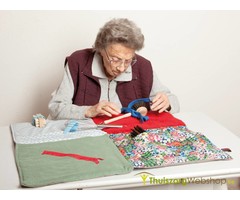
Colored experience handbag
Experience handbag, washable, blue / yellow or black / white.
People with dementia can no longer communicate about the thoughts and feelings behind the symptoms. At least not with words. Yet there is much to learn from their non-verbal communication (body language).
As a result of the memory problems, it is becoming increasingly difficult for the person with dementia to form a picture of reality. For the experience of the here and now, he increasingly relies on old memories. Present and past increasingly intertwine.
In this phase, people with dementia live more and more in their own world, in which their only hold is the experiences, thoughts and feelings of the past. It sometimes happens that certain family members and caregivers think that the person with dementia is acting unusually or strangely and the environment is correct. For the person with dementia, on the other hand, he is correct and the environment is different.
Some examples:
• The person with dementia must go home urgently, because the children are coming home.
• The person with dementia wants to go to work because it is morning on a workday.
• The person with dementia holds a doll for a real baby.
Along with all that, there are the accompanying emotions from the past. Painful experiences from long ago can also come up again. Unprocessed pain or loss can be experienced again in all its intensity, often provoked by a concrete incident in the here and now.
Finally, the high, perhaps even increased, sensitivity must be pointed out. People with dementia realize who takes care of them. They feel with whom they are safe, even though they forget your name and they no longer know that you are a partner or son or daughter. That a trusted person is present gives them peace.
On the other hand, they are sometimes easier to care for by third parties. Maybe other people also get more done from the person with dementia. Try to see that as an opportunity rather than as a rejection.
In this phase, people with dementia need help and supervision, both at home and abroad. In the activities of daily life they are increasingly dependent on help. In their world of the past - which according to their brains is also the world of today - they are young and strong or in any case valid and not in need of help. Hence their opposition to, for example, hygienic care, with statements such as: "I have already been washed" and "My underwear is still clean".
But it doesn't have to be all negative. You cannot get rid of the impression that people with dementia sometimes feel very good in their world. It is then better to disturb them as little as possible and, for example, to overlook some sloppy clothing.















